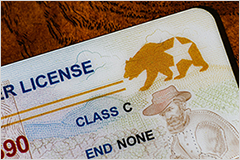Scammers Exploit the Deadline for “Real ID”
An upcoming deadline to obtain security-enhanced personal identification – known as “Real ID” – could prompt a wave of scams, fraud experts are warning.
 The concerns are rooted in a measure approved by lawmakers in the aftermath of the September 11 terrorist attacks. In 2005, Congress passed the Real ID Act, requiring trustworthy proof of identity in order to proceed through airport checkpoints, military bases, and other federal facilities.
The concerns are rooted in a measure approved by lawmakers in the aftermath of the September 11 terrorist attacks. In 2005, Congress passed the Real ID Act, requiring trustworthy proof of identity in order to proceed through airport checkpoints, military bases, and other federal facilities.
States have since issued Real ID drivers’ licenses and identification cards that meet the security standards, which were recommended by the 9/11 Commission. Unlike traditional drivers’ licenses, Real ID drivers’ licenses come with an individual’s encoded personal data, which is scannable, and are marked with a star in the upper right corner. Applicants for Real ID must show proof of identity with multiple valid documents that establish identity, age, and residency, such as a birth certificate, US passport, Social Security card, and a bank account statement – to name just a few.
It has taken many years to make these requirements mandatory, but the time has arrived. Starting on May 7, travelers will be prohibited from taking domestic flights and entering other protected locations unless they show a state-issued Real ID, or other approved forms of identification. The TSA lists the other acceptable forms on its website, including a passport or passport card, a state-issued Enhanced Driver’s License (a few states issue these), a photo ID issued by a federally recognized Tribal Nation/Indian Tribe, or a Veteran Health Identification Card ̶ among others.
While the whole point of the project is to enhance public security, it may also open the door for fraud.
Experts warn that scammers may take advantage of the deadline by selling fake Real IDs to people who have procrastinated in obtaining real ones. Beyond that, the impending date is prompting news coverage that increases public awareness of the need to get a Real ID, potentially expanding the market for fraudsters who wish to take advantage.
“We know anytime people are up against a deadline, they will try to find an expedited way to get the process done,” said Amy Nofziger, director of victim support for AARP’s Fraud Watch Network. “And that’s when the scams pop up.”
Real ID fraud may take the form of phishing, with requests for personal information that look like they are coming from reputable agencies, such as the US Department of Homeland Security (DHS). Consumers are advised to ignore any text message, email, or telephone call seeking personal information that urges you to sign up for Real ID.
To learn more about Real ID, click here for details from DHS, or contact the department of motor vehicle agency in your state.
How Can You Tell It’s a Fraud?
The Real ID scam highlights one of the classic signs of a scam – pressure on the target to act in a hurry. Scammers know that when their targets take the time to think things through, they become less likely to fall into the scammer’s trap. While new kinds of scams are born every day, they often share certain telltale features that consumers should watch out for.
According to the Federal Trade Commission (FTC), the following signs are likely tip-offs that a scammer has you in their sights:
The scammer has reached out to you – and offers to solve a purported problem. They may pretend you owe money to a government agency. They may tell you that a loved one is in trouble. They may caution that your computer has a virus. The key is that they contacted you out of the blue, and pretend you have a problem that must be dealt with.

They seek payment for their help – and not just any payment. Cryptocurrency, gift cards, payment apps, and money wires are the favorites. It may be impossible to recover your cash if you pay through one of these methods.
They pressure you to rush. Scammers do not want you to confirm their story or do your own research. They do not want you to think critically. They may even warn that you face arrest if you do not immediately do what they ask, the FTC reports.
By remembering the warning signs, you can greatly reduce the chance that you will become a victim. Never pay someone who demands compensation only in the forms listed above. Never allow yourself to be pushed into a transaction before you have had proper time to make a good decision. In addition, never click on links or respond to unsolicited communications that seek your personal information or payment for a service you have not sought.
You can report a scam to the FTC by clicking here or calling 1-877-382-4357. If you have questions about a possible scam, you also can call EverSafe’s hotline at 888-728-8850 and/or forward the written communication to hotline@eversafe.com. Scammers may be clever, but you can stop them in their tracks – if you take the right steps to protect yourself and your family.
Beware of Phony Invoices from PayPal
 The phony bill was designed to look like it came from PayPal. But the bill was fake, and the consumers who received it had never purchased the products they were being charged for.
The phony bill was designed to look like it came from PayPal. But the bill was fake, and the consumers who received it had never purchased the products they were being charged for.
The Better Business Bureau Scam Tracker has received more than 200 reports of this particular fraud, which centered on Palomino Bazaar, a small business that sells vintage furniture in Connecticut. Some of the fake invoices were in excess of $1,000. The invoices were sent to consumers and businesses in Connecticut, Pennsylvania, and other states.
PayPal cautions the public to watch out for these kinds of phony invoices, as well as fraudulent messages that seek to lure individuals to fake customer service sites where scammers can steal their personal data.
“These scams are trying to trick you into sending money to a fraudster or providing your personal or financial details to them,” PayPal posted on its website. “Be wary of any messages that are alarmist, warning you to call them quickly to resolve an ‘issue’ on your account.”